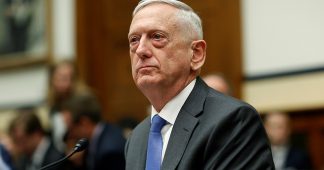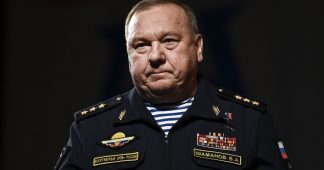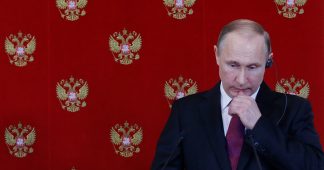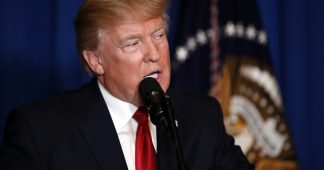By James Cogan
13 April 2018
The momentum toward a US-led attack on the Assad government in Syria continued to build over the past 24 hours, with American, French and British warships deploying in the eastern Mediterranean and aircraft being primed for operations at various bases in Europe and the Middle East.
The military preparations are being accompanied by diplomatic efforts by the Trump administration to cajole the Russian government of President Vladimir Putin to do nothing while the imperialist powers inflict death and destruction on its Syrian ally. Russia has deployed thousands of troops and significant air and naval assets to support Assad’s forces in the now seven-year civil war against US and European-backed rebels, which include Al Qaeda affiliates and other Islamist militias.
The build-up for an attack is proceeding even as its ostensible justification—that Assad’s forces used banned chemical weapons last weekend in the city of Douma—has been exposed as having just as little credibility as the imperialist claims in 2002–2003 that Iraq had “weapons of mass destruction.”
Russian inspection teams found no evidence of chemical weapon use in Douma and Russian military police are protecting the alleged site of the incident to prevent any attempt by Syrian rebels to contaminate it. On Russia’s initiative, a team from the Netherlands-based Organisation for the Prohibition of Chemical Weapons (OPCW) is due to arrive in Syria on Sunday to conduct its own inspection.
Such is the absence of any evidence of a chemical attack that US Defense Secretary Jim Mattis refused Wednesday to accuse the Assad government. “We are still assessing the intelligence, ourselves and our allies. We’re still working on this,” he told journalists. Remarkably, Mattis made this statement just hours after Trump tweeted that Russian forces in Syria should “get ready,” because missiles would be coming “nice, new and ‘smart’.”
Mattis’s cautious comments did not prevent French President Emmanuel Macron declaring on national television yesterday that his government had “proof that last week, 10 days ago even, chemical weapons were used—at least chlorine—and that they were used by the regime of Bashar al-Assad.” The French government provided nothing to substantiate these assertions.
Nor has the lack of evidence prevented British Prime Minister Theresa May’s cabinet endorsing British involvement in “action” against Syria, on the fraudulent grounds that it was “highly likely” that the Assad government used chemical weapons.
The danger that US, French and British strikes on Syria could lead to direct clashes with Russian forces cannot be underestimated.
News reports indicate that the Syrian military has re-deployed its air force and other critical assets to Russian-manned and defended facilities, including the Tartus naval base and the Latakia air base. Between 10 and 15 Russian warships and submarines have left port and are reportedly carrying out live fire drills ahead of a potential clash with the US, French and British ships converging on Syria’s coast. Russian fighters and fighter-bombers, some armed with anti-shipping missiles, are patrolling Syrian airspace.
The Putin administration and Russian military, which publicly stated that it would retaliate if its forces come under attack, are engaged in apparent frantic efforts to convince the Trump administration to back down. Alexander Golts, a Russian journalist and military analyst, told the New York Times: “Right now, the talk is about the necessity of de-escalation. We’ve practically come to the brink of war.”
In his latest tweet on the tense stand-off, Trump flagged that action by US forces may not be as imminent as he indicated just 24 hours earlier. He wrote yesterday morning: “Never said when an attack on Syria would take place. Could be very soon or not so soon at all!”
Mattis followed Trump’s tweet by telling the congressional House Armed Services Committee that any decision on military action had to consider “how do we keep this from escalating out of control.”
The Trump administration, however, is under intense pressure from powerful sections of the American political and media establishment to carry through on its threats against Syria, regardless of the consequences. The real motive is not punishing the Assad government. It is to assert American influence in the Middle East, which has been weakened by the Russian and Iranian actions that stymied its regime-change intrigues in Syria.
More fundamentally, it is part of the broader US conflict with Russia, which is now formally classified as a “strategic competitor” of US imperialism.
The American ruling class is not prepared to accept that Russia can use its possession of a vast nuclear arsenal to defy the US attempt to maintain its waning global economic and strategic dominance. By inflicting a major humiliation on Putin in Syria, the US military-intelligence apparatus calculates it will encourage opposition to his government within the Russian ruling elite.
By exerting immense political, economic and military pressure on Russia, the objective is to establish a compliant regime in Moscow. The full US focus would then be concentrated on confrontation with China, which is deemed the main “great power” rival of American imperialism.
The underlying anti-Russian agenda, which the Trump administration has been pressured to pursue through the hysteria over alleged “meddling” in the 2016 presidential election, emerged clearly during yesterday’s confirmation hearings for the new secretary of state nominee, outgoing CIA head Mike Pompeo.
Pompeo left no doubt that the Putin regime is the main target behind the war crisis in the Middle East. Discussing Syria, the Trump administration’s imposition of sanctions on Russia and the expulsion of Russian diplomats over the Skripal affair in Britain, he declared: “Vladimir Putin has not yet received the message sufficiently and we need to continue to work at that… This administration announced a nuclear posture review that has put Russia on notice that we’re going to recapitalise our deterrent force.”
Pompeo continued: “In Syria, a handful of weeks ago, the Russians met their match. A couple hundred Russians were killed.” This is a chilling boast about a US air strike last month that targeted and slaughtered Russian military contractors. The US, he blustered, “need to make sure that Vladimir Putin doesn’t succeed in what he believes his ultimate goal is.”
If Trump were to back down over Syria, it would be assessed in US ruling circles as an abject capitulation to Putin and only intensify the already advanced efforts to remove him as president.
Another major factor behind the stoking of a crisis in Syria is the fear in the American ruling class, and that of its French and British allies, of the rising tide of working-class unrest they confront, and the growing political radicalisation of youth.
War provides a means to divert social discontent and the pretext to step up efforts to persecute dissent and opposition. A direct relationship exists between the drive to war and the rapid moves to impose sweeping censorship of oppositional views on the Internet, especially by publications such as the World Socialist Web Site and on social media sites such as Facebook.











